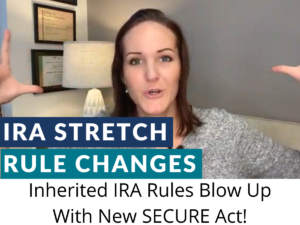
Schedule your free 15-minute retirement strategy call >>>https://bit.ly/2y85PTq
The Coronavirus
Reacting to the coronavirus, stocks suffered some of their sharpest and quickest losses ever this week, with the stock market dropping 15.8% from the recent highs in just a few days.
Unless you have ice water running through your veins, you are most likely concerned about the coronavirus – the health threat that it poses and the impact that it’s already had on your investment portfolio.
We’ve received concerned phone calls, so we wanted to share with you our perspective, and remind you that now is not the time to abandon your long-term strategy and sell into the current downturn. We’ve been through these downturns before, and while it may seem scary in the moment, the important thing is not to let the panic tempt you into making a bad decision.
Billionaire investor Warren Buffett makes this point well: “Be fearful when others are greedy and greedy when others are fearful.”
While this disease is worse than the common flu it is not the plague. So far, we have 60 reported cases in the U.S. and no deaths. The flu causes almost 84 deaths each day (2017-2018), yet we travel, interact, and go about our daily lives without living in fear or isolation.
Unexpected outbreaks like the coronavirus are nothing new. We experienced viral and bacterial outbreaks in 2002-2003 with SARS and in 2012 with MERS without the world economy falling into a depression. It seems likely that this event will play out over the course of 3-4 months, and we are nearly two months into this one already.
The Market Overreacts
Unexpected shocks to the stock market like we’re seeing now are quite common. If it’s not coronavirus, it’s a government shutdown, a natural disaster, a terrorist attack, a sovereign debt crisis, or a trade war. The stock market reacts to unexpected shocks nearly every year, and often (as we believe is happening right now) the market overreacts.
Some corrections are more serious and long-lasting than others, but most are temporary and completely normal. In fact, from 1980 to 2015, despite finishing up for 27 of those 35 years, the stock market dropped an average of 14.2% at some point during the calendar year.
Travel, leisure, and companies dependent on China for their supply chains will be particularly hard hit, but once we see the outbreak peak or get a bit of good news, confidence should start to recover, worldwide economic activity should pick up again, and life will eventually return to normal.
So What Should You Do About The Recent Selloff In The Stock Market?
For most of our clients, the best advice we can give you is to do nothing. The likelihood is that your asset allocation (i.e. your stock and bond mix) is aligned for your age, and your investment portfolio is positioned to handle a downturn. When your asset allocation is aligned for your age, losses you’re seeing in the stock market do not translate directly to sharp losses in your investment portfolio – especially if you are close to retirement or if you are already retired.
And for our clients who have a lot of cash on the sidelines or who were lower in stocks heading into this downturn, we’ve been buying.
Bottom Line
This is not the time for selling. Nothing is fundamentally wrong with the U.S. economy. It may take weeks or months for the market to recover, but we don’t view the coronavirus as a catalyst for far worse economic and stock market woes to come.
*For more on the coronavirus, listen to the One Minute Retirement Tip with Ashley, episodes 505 – 511 >>> https://apple.co/2TgPCHz
THANKS FOR READING!
Did this answer your questions? Did you find it valuable? Please subscribe to our newsletter below to receive future updates in your inbox!
>>CLICK HERE TO SUBSCRIBE TO OUR NEWSLETTER <<
Recent & Related Posts:
Disclosure:
The views outlined in this newsletter are those of True North Retirement Advisors (TNRA) and should not be construed as individualized or personalized investment advice. Any economic and/or performance information cited is historical and not indicative of future results. Economic forecasts set forth may not develop as predicted.
Different types of investments involve varying degrees of risk, and there can be no assurance that the future performance of any specific investment, investment strategy, or product made reference to directly or indirectly, will be profitable, equal any corresponding indicated historical performance level(s), or be suitable for a given client or portfolio.
Investing in stocks includes numerous specific risks including the fluctuation of dividend, loss of entire principal and potential illiquidity of the investment in a declining market. Bonds are subject to market and interest rate risk if sold prior to maturity. Bond and bond mutual fund values and yields will decline as interest rates rise and bonds are subject to availability and change in price.
Any questions regarding the applicability of any specific issue discussed above should be addressed with TNRA. All information, including that used to compile charts and/or tables, is obtained from sources believed to be reliable, but TNRA has not verified its accuracy and does not guarantee its reliability.
Moreover, you should not assume that any discussion or information contained in the newsletter serves as the receipt of, or as a substitute for, personalized investment advice from TNRA or from any other investment professional. To the extent that you have any questions regarding the applicability of any specific issue discussed above to your individual situation, you are encouraged to consult with TNRA or the professional advisor of your choosing. All information, including that used to compile charts, is obtained from sources believed to be reliable, but TNRA has not verified its accuracy and does not guarantee its reliability.






